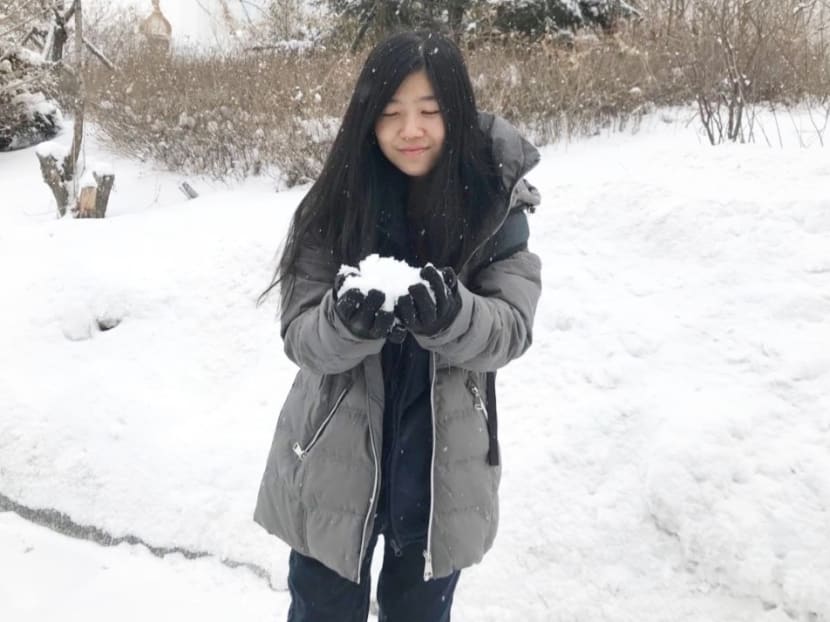Gen Y Speaks: I was quite a delicate girl. Being a doctor toughened me up
On Jan 8, after returning from a week-long trip to the icy city of Harbin, China, I went straight to work. As a junior on-call doctor being rotated to a new ward, I took a full call from evening until the next afternoon.

The author (seen here in Harbin during a trip in Jan 2020) says that growing up, she was never used to getting up and being hard at work at unearthly hours.
On Jan 8, after returning from a week-long trip to the icy city of Harbin, China, I went straight to work. As a junior on-call doctor being rotated to a new ward, I took a full call from evening until the next afternoon.
By the following week, I was more or less used to my new colleagues, new department and new patients. A week later, as Singapore confirmed its first Covid-19 infection, I had to adapt again.
Since then, as more cases are confirmed and preventive measures are stepped up under Dorscon Orange, my colleagues and I have had to make more adjustments.
Yes, junior doctoring is hard.
Often with hardly any time to rest, eat or sleep, our lives seethe with urgency, discomforts and exhaustion, and are plagued with full-blown "empty stomach full bladder syndrome", as well as unexpected challenges such as a coronavirus outbreak.
Fear did strike me when I first saw photos of the situation in China: People wearing multiple masks on trains, hospitals running out of beds fast, and an unprecedented lockdown in Wuhan.
I happened to have visited four cities in the southern and northeastern regions of China in the last two months, to join a learning journey and governmental meeting on Singapore-China relations respectively.
Who would have imagined that just two months back, I was in Shenzhen chatting leisurely with healthcare management graduate students of Tsinghua University, who must now be so busy alleviating the situation and conducting public education?
My heart also goes out to fellow healthcare workers in China, as I cannot imagine what they are going through.
While my workplace is not at the frontline dealing directly with Covid-19 patients, work has become more hectic since Singapore moved from Dorscon Yellow to Dorscon Orange on Feb 7.
For example, all my wards would now always be full. Empty beds would be speedily occupied by patients transferring in from a separate block meant to be emptied as a "standby" ward to accept patients with fever and suspected cases for Covid-19.
Furthermore, as I work at a private ward which often sees foreign patients, I am constantly on high alert for patients who are unwell with a significant travel history.
To optimise bed space, I am also steadily discharging patients who are deemed stable enough to return home.
Amid work, I began to consider and prepare for the worst. Some of my colleagues, including nursing staff, shared my concerns.
We eventually placed our faith in the authorities and also in ourselves to be strong enough for this battle.
Thankfully, my brief journey in medicine of almost two years has built my inner capacity to handle change and pressure, as well as instilled a survival instinct in me.
The support from colleagues, friends and sometimes patients made me feel that what I do is worthwhile.
I once worked at a hospital which put the physical strength of doctors to the test.
Some on-call doctors did not have rooms and had to resort to wandering around the hospital looking for a small sofa in between calls.
For those who managed to get rooms, it was sometimes one with double-decker bunk beds, to be shared with another colleague. It was quite an uncanny experience as there were times I shared a room with male colleagues.
Junior doctoring comes with its fair share of sacrifices. One colleague lamented how she has lost her youth, complexion and pens all in one hospital.
I have since made it a tradition to gift female colleagues face masks for special occasions such as their birthdays, or when they have kindly helped to swap call shifts with me.
Male junior doctors, on the other hand, tend to gain or lose weight, from lack of exercise or lack of time to eat respectively.
Near car accidents, or minor car accidents, are not unheard of among doctors, for example after a tiring day or after a call. For this reason, many of my colleagues opt not to drive after a call to stay safe.
I am sometimes quite struck at how I have adjusted to life as a junior doctor. Growing up, I was never used to getting up and being hard at work at unearthly hours.
I was in fact quite a delicate girl. When I was a child, I would find it difficult to fall asleep on any bed besides my own, and preferred to have a fixed timing for sleep, eat and work.
Now, I seem to be able to fall asleep on any given flat surface and have become used to changing my body clock for a given situation, such as taking an overnight on-call shift (sometimes back-to-back), starting work immediately after a tiring trip and adapting quickly to different time zones, such as when attending an overseas conference.
Medicine has toughened me up. I am certain that I can say the same of many of my colleagues.
In times of crises, I am heartened that Singapore and our healthcare workers have a "never-say-die" spirit. I am confident that we can weather the storm and emerge tougher and stronger from this challenging episode.
ABOUT THE AUTHOR:
Alvona Loh Zi Hui is a junior doctor who works at a public hospital in Singapore.






